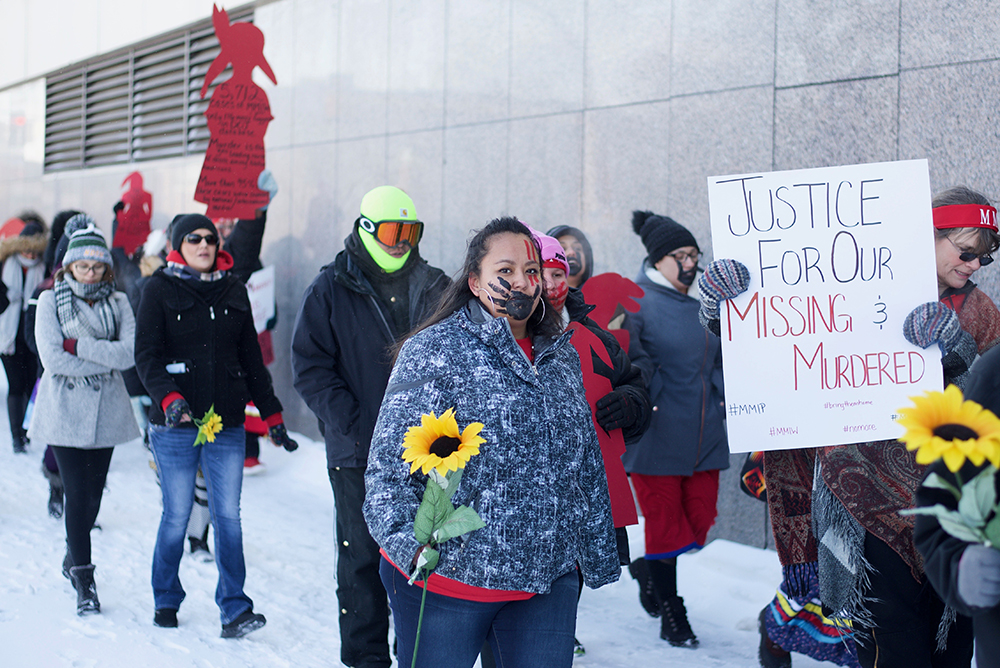Tracey L. Wilkie explains the importance of awareness to indigenous peoples march
JOHN SWANSON | THE SPECTRUM
People marched around downtown Fargo to spread awareness about missing and murdered indigenous people.
Everyone has a story for participating in a protest or march. Tracey L. Wilkie, a member of the Turtle Mountain Band of Chippewa, wanted to participate in the annual Missing and Murdered Indigenous Peoples March Feb. 14, but due to her mother being hospitalized, she missed her opportunity. Wilkie shared her experience on the reservation and being an indigenous woman.
Wilkie’s story begins at the reservation, constantly hearing others speak about how common it is for indigenous women to be raped. The first word she learned how to spell was “rape” because she heard the word so often from others fearing it. “I’m thankful I left when I did because I don’t think I’d be alive if I’d have stayed here,” Wilkie continued. “It’s something (rape and murder) that’s been going on for hundreds of years, and something I’ve been hearing about my whole life.”
“Our girls need some help; we go missing 10 times more the national average on the reservation.”
Tracey L. Wilkie
Wilkie was unable to raise her first two children due to being a young mother. Her parents raised them on the reservation for her, which was later used against her in an abusive court case.
When she left the reservation she moved to Portland, Oregon. For 20 years, Wilkie worked at a jail where she dealt with constant institutional racism. Throughout her years, she was sexually harassed by her boss, but when she filed a report, no one believed her. Wilkie explained she believed it is because she is a Native American woman and that people thought she was using the system.
After reporting the harassment, Wilkie had her kids taken away from her and given to the boss. “I’ve been fighting for a long time to get away from him,” Wilkie said. She explained how he is still free and continuing his abusive tendencies toward others.
Due to the court case, she became so stressed that she became bedridden. Now, being able to walk and talk, she feels free again. “I just walked out of hell,” Wilkie said.
Growing up, Wilkie was close with Savanna La-Fontaine-Greywind’s family. LaFontaine-Greywind was a missing and murdered pregnant North Dakotan in 2017. She was the face of the Missing and Murdered Indigenous Peoples March, and some chanted their support of Savanna’s Act with her face on a banner as they marched. Wilkie testified twice at the capitol for Savanna’s Act, a federal bill that “requires Department of Justice (DOJ) to update the online data entry for federal databases relevant to cases missing and murdered Indians to include a new data for users to input the victim’s tribal enrollment information or affiliation,” according to Congress.gov.
“(LaFontaine-Greywind’s disappearance) was very scary because I have a daughter,” Wilkie said. She explained how she has experienced human trafficking through her daughter, Dallas. “Our women are disappearing fast,” Wilkie said.
Through the marches, Wilkie said she sees it as a time to be vocal and stand up to show that there is a problem. “Colonialism has not been good to us. The poverty that puts us into a whole new level of survival day in and day out that takes its toll,” Wilkie explained.
Wilkie recommends taking part in ceremonies, go to support groups, learn how to use your voice and overall educate yourself on the issue. “Our community needs to come together with healing and not further divide,” Wilkie continued, “We all have something going on that nobody knows about, but it’s time to come together.”



